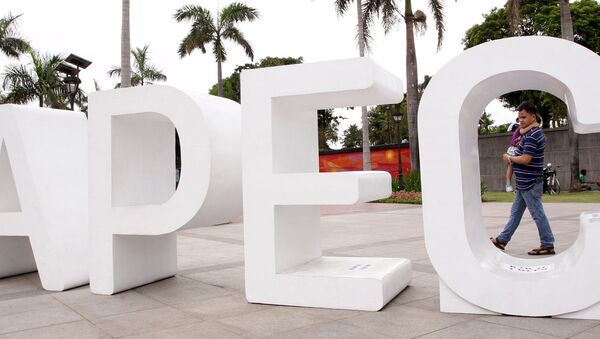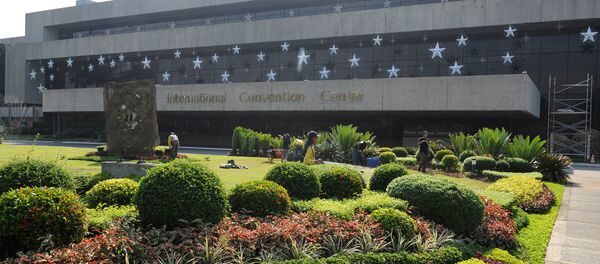China has been excluded from the recently concluded Washington-backed TPP free trade deal between 12 Pacific Rim countries.
“In terms of the TPP, the issue is complicated by a lot of political factors. For business people, if China can join, it would be beneficial for businesses," Xia, who was the Executive Director of ABAC during China’s hosting year in 2014, said.
He added that China should be included in any endeavor to create a free trade bloc, being the second largest economy and the largest trading country in the world.
"As business people, we do not want to be complicated by political factors. We just want to do business,” Xia stressed.
Territorial disputes between Beijing and a number of South Asian countries do not harm Chinese businesses in the region and are unlikely to be raised on the sidelines of APEC Economic Leaders’ Week underway in Manila, Xia Bing, chief staffer of China in the APEC Business Advisory Council (ABAC), told Sputnik.
“I think certainly territorial disputes had a negative impact on the relations between China and other South Asian countries. But business ties between China and South Asia have always been very close. So business is as usual," Xia, who was the Executive Director of ABAC during China’s hosting year in 2014, said.
He added that APEC is an international platform to talk about economics, not politics, so he does not expect such disputes to be discussed there.
An all-inclusive free trade zone for the entire Asia-Pacific region can be created only when nations overcome their political differences, so patience is needed, Xia Bing, chief staffer of China in APEC Business Advisory Council (ABAC), told Sputnik.
Leaders of APEC member states will meet in Manila November 18-19. China is expected to challenge the US-led Trans-Pacific Partnership (TPP) by promoting a Free Trade Area of the Asia-Pacific (FTAAP) that would include all APEC members, unlike the controversial TPP, which would comprise only 12 Pacific Rim nations.
“FTAAP is a very ambitious goal, to be frank. But we have to be patient. There are a lot of political complications in the region," Xia, who was the Executive Director of ABAC during China’s hosting year in 2014, said.
He added that businesspeople "just want to do business" and the ideal trade bloc from the private sector’s point of view would be a free trade area of the entire Asia-Pacific region.
Promoting small and medium-size enterprise (SME) will be a key issue for the Chinese G20 presidency agenda next year, Xia Bing, chief staffer of China in APEC Business Advisory Council (ABAC), told Sputnik.
"One of the main focus will be on SMEs," Xia Bing, who also acts as a paid consultant for local business to engage with G20, said.
He added that, while under Turkey’s presidency, an SME task force was created. China will develop these efforts and put emphasis on the development of small and media-size enterprises, according to the consultant.
"Everybody agrees that SMEs are the future of business. It’s the future of growth and innovation and China actually has very good experience in promoting SMEs and enabling them to build a commercial environment that serves their interests," Xia, who was the Executive Director of ABAC during China’s hosting year in 2014, said.
Xia Bing is currently involved in advising Chinese businesses on their engagement at international organizations such as APEC and G20. Among his clients are top Chinese companies including Huawei, DHGate.com and Tsinghua Tongfang Group.



